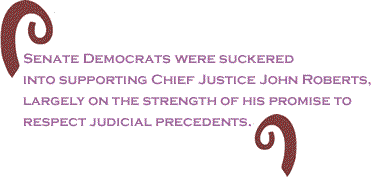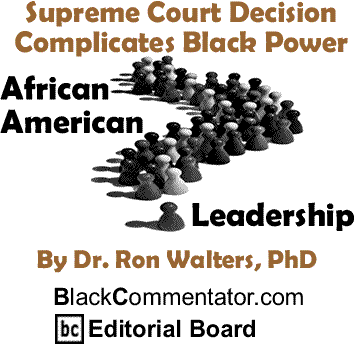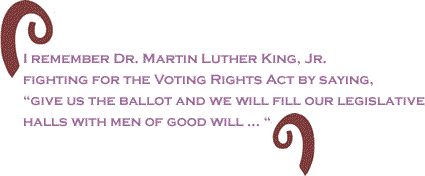
|
||||||||||||||||||||||
|
||||
 |
||||
| The Supreme Court, in their recent decision in Citizens United v. Federal Election Commission, may have complicated the growth of black elected officials by their 5-4 conservative majority giving corporations carte blanche authority to directly spend money in elections.�� By deciding that corporations have First Amendment rights to spend money in elections to voice their preferences, they have been given the right of �persons� in constitutional law.�� In effect, they now have the same rights to influence elections as individuals, when the differences in power, status and capability is obvious.
This decision enables the enormous wealth of the capitalist system to enhance its ability to determine winners and losers in American elections, and since data from the 2008 elections indicated that corporations gave twice as much money to Republicans than Democrats, it tilts the playing field strongly in their direction. Blacks who campaign for office have traditionally had far less funding than their white counter-parts which is why many opposed the McCain-Feingold campaign finance law that placed limits on soft money.� Black elected officials were disproportionately recipients of soft money in their campaigns, and studies show that within the black community they could raise enough money to run campaigns successfully.�� The Supreme Court decision however, not only destroys McCain/Feingold by inviting even more money into campaigns, it also places blacks, especially those who would run in �white districts,� in a highly competitive bind.�� It is still very difficult for blacks to run in such districts and win, and they are placed at a huge disadvantage because money generally goes to white candidates in those districts.�� This means that although blacks have run successfully in many white majority districts, representing 40% of the Congressional Black Caucus, it will be more difficult to expand the number of elected officials beyond what now exists.
Most importantly, a significant portion of the black community needs the social and economic product of legislative action at every level, but with more candidates being elected with corporate funds, it could skew the democratic process within legislative bodies toward the interests of the upper class.� This point is vividly seen in the current fight over health care, as a substantial number of members of Congress, funded by corporations, oppose restrictions on insurance companies and the expansion of care to thirty million people.�� Someone said it right, the impact of the United Citizens decision is that rather than having Senators and Representatives serving the interests of their constituents in states, more of them will essentially be owned by corporations.�
This decision of the High Court, together with the actions of Republican conservatives in the Congress, illustrates how determined and single-minded progressives must be to defeat them.� The ball limiting money in American elections has been tossed back to the White House and the Congress, let�s see how much Democracy they really want. BlackCommentator.com Editorial Board member, Dr. Ron Walters, is the Distinguished Leadership Scholar, Director of the African American Leadership Center and Professor of Government and Politics at the University of Maryland College Park. His latest book is: The Price of Racial Reconciliation (The Politics of Race and Ethnicity) (University of Michigan Press). Click here to contact Dr. Walters. |
||||
 |
||||
If you would like to comment on this article, please do so below. There is a 400 character limit. You do not need a FaceBook account. Your comment will be posted here on BC instantly. Thanks. Entering your email address is not mandatory. You may also choose to enter only your first name and your location.
|
||||
Thank you very much for your readership. |
||||
| Any BlackCommentator.com article may be re-printed so long as it is re-printed in its entirety and full credit given to the author and www.BlackCommentator.com. If the re-print is on the Internet we additionally request a link back to the original piece on our Website. | ||||
| |
||||
Issue 360 |
| Executive Editor: Bill Fletcher, Jr. |
| Managing Editor: Nancy Littlefield |
| Publisher: Peter Gamble |
| Est. April 5, 2002 |
| Printer Friendly Version in resizeable plain text format |
 |
 |
 |

|
 |
| |
| |











































